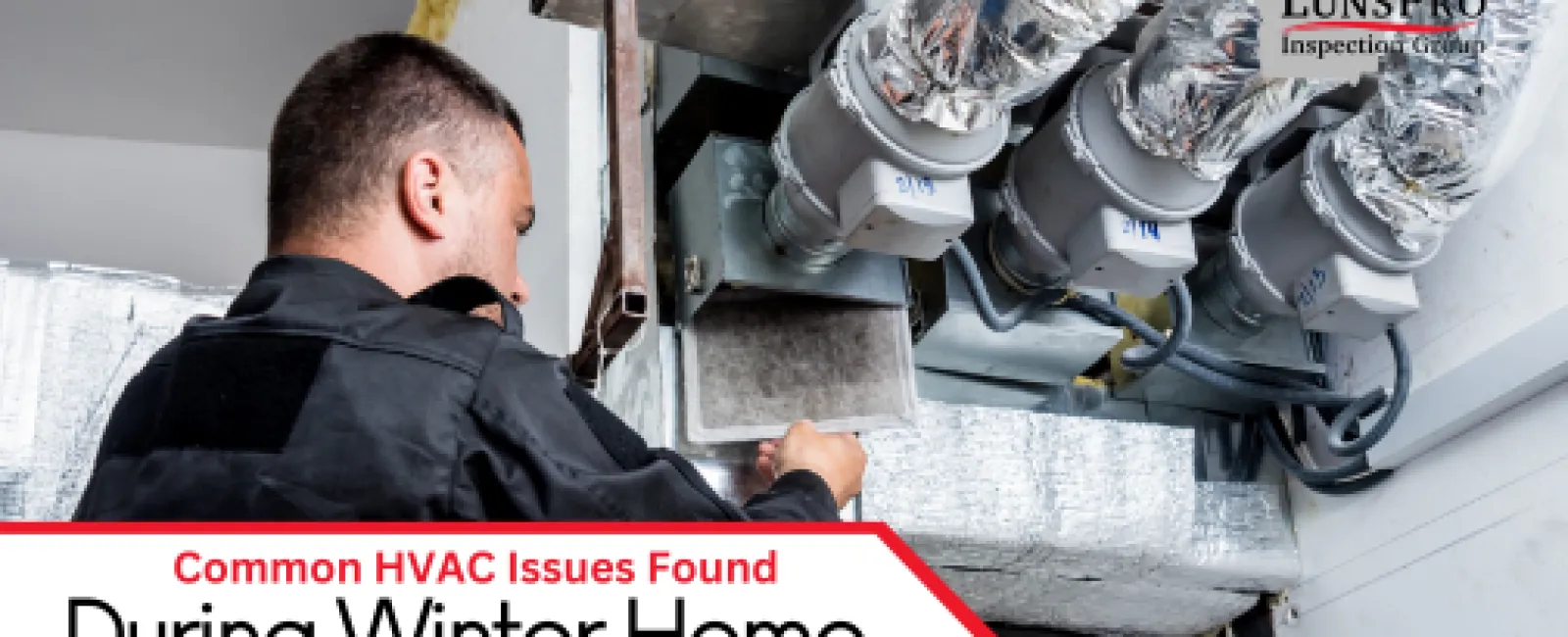When winter settles in across North Carolina, homeowners rely heavily on their heating systems to maintain warmth and comfort. However, winter also brings an increased likelihood of discovering HVAC issues during home inspections. These issues can significantly affect home value, energy efficiency, and occupant safety. At LunsPro Inspection Group, we conduct thousands of Charlotte, Greensboro, and Raleigh residential and commercial inspections annually, and winter often reveals some of the most concerning problems related to heating, ventilation, and air conditioning (HVAC) systems.
Whether you're buying, selling, or maintaining a property, understanding the common HVAC issues that arise in winter inspections is essential. For property owners in the Triad and Triangle areas, a winter home inspection can offer a critical snapshot of your system's health when it's working hardest. Let's dive into the most frequently encountered HVAC problems and why addressing them matters.
The Importance of Winter HVAC Inspections
Home inspections serve as a vital diagnostic tool, especially during the colder months. When outdoor temperatures drop, heating systems are under strain, which can expose inefficiencies or outright failures. Winter inspections allow professionals like those at LunsPro Inspection Group to assess the full functionality of HVAC systems while they are actively in use.
In regions like Charlotte, Greensboro, and Raleigh, residential and commercial inspections during winter can reveal issues that may not surface in milder seasons. In the Triad and Triangle areas, it's not uncommon for inspectors to uncover significant heating problems that require immediate attention to avoid costly repairs or even health hazards.
Most Common HVAC Issues Found in Winter Inspections
1. Dirty or Clogged Air Filters
A simple yet often overlooked issue, dirty air filters can restrict airflow, reduce system efficiency, and place added strain on HVAC components. During winter, this can lead to uneven heating or increased energy bills. Homeowners should replace filters every 1-3 months, especially during peak heating seasons.
2. Faulty Thermostats
Inaccurate thermostat readings or malfunctioning units can result in poor temperature regulation. This not only compromises comfort but may also lead to unnecessary energy consumption. Our North Carolina home inspections often identify thermostats that need recalibration or replacement to ensure proper performance.
3. Ignition or Pilot Light Failures
Gas-powered heating systems rely on ignition components to operate efficiently. Faulty igniters, pilot lights, or thermocouples can cause a complete heating system failure. This issue is particularly common in older systems and is frequently identified in inspections throughout the Triad and Triangle areas.
4. Inadequate Insulation or Ductwork Leaks
While not part of the HVAC unit itself, poor insulation and leaking ducts drastically reduce heating efficiency. Our inspectors at LunsPro Inspection Group often find disconnected or poorly sealed ductwork in attics and crawl spaces, which can waste warm air and increase heating costs.
5. Blower Motor Problems
The blower motor distributes warm air throughout the home. When it malfunctions, heating can become inconsistent or nonexistent. In winter inspections, we regularly discover motors that are overworked due to blocked filters or lack of maintenance.
6. Refrigerant Issues in Heat Pumps
Heat pumps are popular in the mild climate zones of North Carolina. However, low refrigerant levels or leaks can prevent these systems from adequately heating the home during colder months. This issue is particularly problematic when outside temperatures approach freezing.
7. Cracked Heat Exchangers
A cracked heat exchanger in a furnace is one of the most serious HVAC issues we encounter. It can result in carbon monoxide leaks, posing a severe health risk. At LunsPro Inspection Group, our trained inspectors are vigilant in identifying signs of a compromised heat exchanger during winter home inspections.
8. Frozen or Blocked Outdoor Units
For HVAC systems with outdoor components, snow, ice, and debris can block airflow or damage parts. This is a common concern in the Triad and Triangle areas during the occasional winter storms. We often find systems struggling to operate because of ice accumulation or inadequate drainage.
9. Inadequate System Sizing
Some HVAC issues arise from improper system sizing. If a heating system is too small, it will struggle to maintain temperature on colder days. Conversely, oversized systems can short-cycle, leading to wear and tear. During our Charlotte, Greensboro, and Raleigh residential and commercial inspections, we check to ensure HVAC systems are appropriately sized for the square footage they serve.
10. Lack of Routine Maintenance
Neglected HVAC systems are more prone to failure. Our North Carolina home inspections often reveal signs of deferred maintenance, such as dirty coils, corroded components, or clogged drains. Regular servicing can prevent most of these issues and extend the life of the system.
Why HVAC Issues Are a Dealbreaker in Real Estate Transactions
When buyers see HVAC problems flagged during inspections, it can lead to renegotiations, repair demands, or even withdrawn offers. For sellers in Charlotte, Greensboro, or Raleigh, residential and commercial inspections are a critical step in preparing a property for the market. Addressing HVAC issues in advance increases buyer confidence and can help justify your asking price.
For buyers, a comprehensive winter inspection helps ensure you're not investing in a home with costly hidden problems. Heating systems are essential to comfort and safety, particularly during cold North Carolina winters. Knowing what to expect from an HVAC system can inform your buying decision and budgeting.
The Role of LunsPro Inspection Group in HVAC Evaluations
At LunsPro Inspection Group, we go beyond surface-level assessments. Our certified inspectors conduct detailed HVAC evaluations as part of every home inspection. Whether the property is residential or commercial, we provide expert insights into the current condition and future expectations of the heating system.
Serving clients throughout Charlotte, Greensboro, and Raleigh, residential and commercial inspections are our specialty. We understand the regional climate and how it affects system performance during the winter months. Our inspections are comprehensive, covering every aspect of the HVAC system, including:
Furnace and heat pump operation
Thermostat calibration
Ductwork integrity
Filter condition
Electrical connections
Refrigerant levels
Safety controls
Carbon monoxide detection
Our reports include high-resolution photos, detailed notes, and clear recommendations so that homeowners and real estate professionals can take decisive action.
Preventative Steps for Homeowners in Winter
Homeowners can take proactive measures to avoid many of the HVAC issues discovered during inspections:
Schedule annual HVAC servicing before winter begins.
Replace air filters regularly to ensure proper airflow.
Seal ductwork to prevent air leaks and energy loss.
Inspect outdoor units for blockages or ice buildup.
Install programmable thermostats to optimize energy use.
Keep vents and registers unobstructed for even heat distribution.
In the Triad and Triangle areas, winter can be unpredictable. A well-maintained HVAC system is essential not only for comfort but also for home value and safety.
The Value of Winter HVAC Inspections
Winter brings out the worst in underperforming HVAC systems. That's why it's one of the most critical times to schedule a home inspection, whether you're preparing to sell, considering a purchase, or simply want to maintain your home. At LunsPro Inspection Group, our winter inspections provide clear, actionable insights into your HVAC system's condition, helping homeowners and investors make smart, informed decisions.
In Charlotte, Greensboro, and Raleigh, residential and commercial inspections are a vital tool in real estate and property maintenance. Our work across the Triad and Triangle areas has shown us that HVAC issues are among the top concerns for buyers and sellers alike during winter inspections. Identifying and addressing these problems early can mean the difference between a smooth transaction and a failed deal.
North Carolina home inspections are more than just a formality—they're a gateway to understanding your property's true condition. Don't wait until it's too cold or too late.

